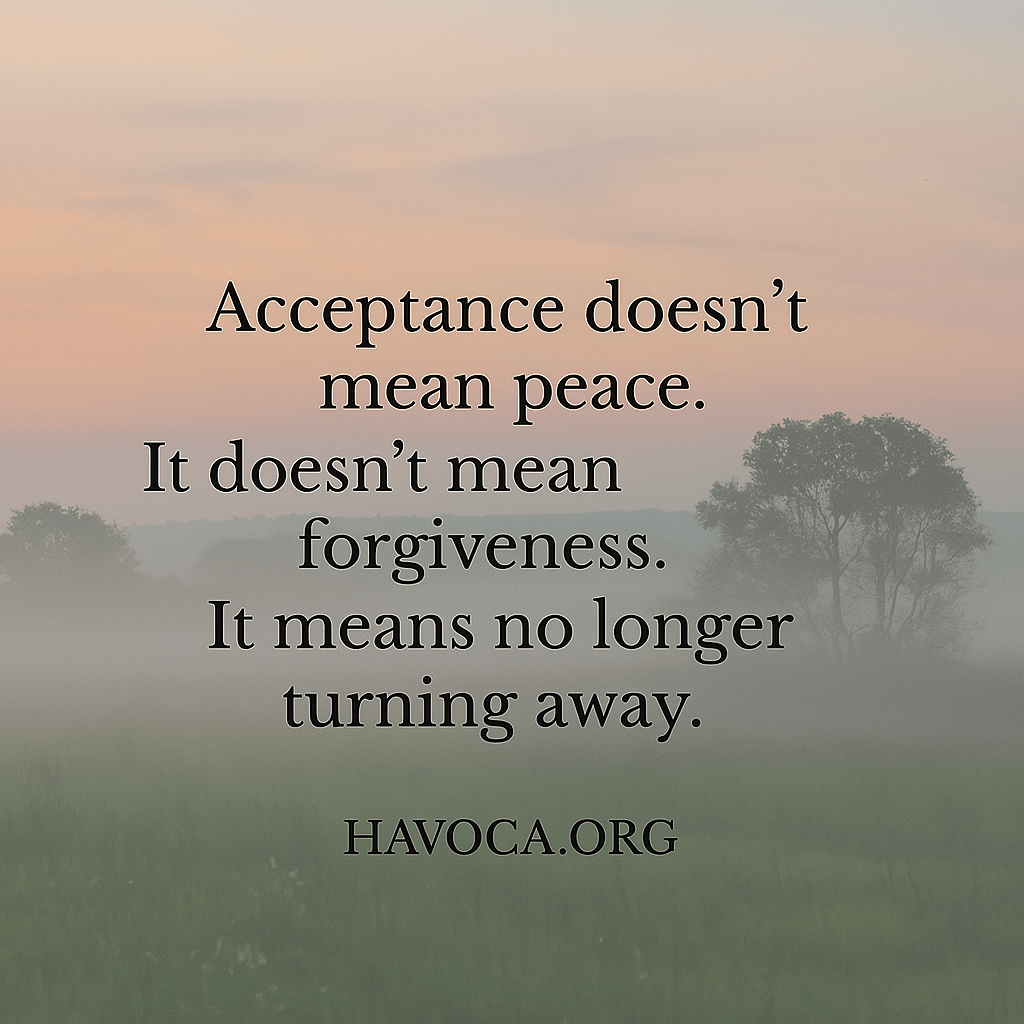 Facing the Hard Truths: Accepting What Feels Impossible
Facing the Hard Truths: Accepting What Feels Impossible
Some facts arrive in our lives like thunderclaps. Others creep in slowly, uninvited, unwelcome — then stay.
For one survivor on our Survivor Boards, the truth came in layers:
“I really struggled to accept that my dad was a paedophile. It’s taken me the guts of 20 years to get my head round it and say it out loud.”
It’s a reality many survivors will recognize. The facts of abuse can be so devastating, so psychologically incompatible with love, safety or family, that our minds protect us by refusing to fully let them in. And when the abuser is a parent — someone tied to our identity, our early memories, our need for belonging — accepting the truth can feel like losing oxygen.
Why Acceptance Is Hard
Accepting what happened isn’t just about acknowledging facts. It’s about:
- Untangling loyalty from survival
- Facing societal disbelief and stigma
- Enduring internal resistance and emotional fog
- Grieving not just abuse, but the parent-child bond we were supposed to have
Sometimes the truth isn’t resisted — it’s buried under layers of numbness, fragmentation, or a lifetime of gaslighting.
Many survivors say:
- “I knew, but I didn’t want to know.”
- “I couldn’t afford to believe it when I still needed him.”
- “I had no words for it until I heard someone else say it first.”
What Can Help
While there’s no fast path to acceptance, these steps have supported others:
- Name the truth privately. Write it down, say it to yourself. “My dad abused me. My dad is a paedophile.” It doesn’t have to be public to be real.
- Witness others. Reading survivor stories or forum posts helps reduce isolation and builds internal permission to believe your own.
- Avoid rushing yourself. Acceptance isn’t a checkbox — it’s emotional metabolizing. It unfolds at the pace your nervous system can tolerate.
- Use anchoring statements. Try: “What happened to me was real. My reactions make sense. Protecting myself now is valid.”
- Consider therapeutic support. A trauma-informed therapist can walk beside you as you make space for painful truths.
- Create emotional safety. Journaling, grounding, or connecting with trusted people helps counterbalance the upheaval.
Saying It Out Loud
When you’re ready to say it — even just once — something shifts. Not in a dramatic, fireworks way. But quietly, internally. As if your body stops waiting for you to hide the truth.
For the member who shared this: saying it took twenty years. That’s not a failure — it’s a triumph. Because acceptance doesn’t come from force. It comes from readiness.
And when we name the truth, we reclaim our power. Not because it no longer hurts — but because we no longer lie to ourselves to survive.
Final Thoughts
You may not be able to accept what happened today, or this year, or even this decade. That’s okay.
Acceptance doesn’t mean peace. It doesn’t mean forgiveness. It means no longer turning away.
Whatever truth you’re still circling — you’re allowed to face it slowly. And when you do… we’ll be here.
Suggested Reading: Accepting Difficult Truths
1. The Body Keeps the Score
Author: Bessel van der Kolk
Focus: How trauma reshapes the body and brain — and how survivors can heal
Why it matters: Offers insight into why acceptance of abuse may take years and affirms the body’s role in remembering what the mind struggles to hold. Quote:
“As long as you keep secrets and suppress information, you are fundamentally at war with yourself… The critical issue is allowing yourself to know what you know. That takes an enormous amount of courage.”
2. What My Bones Know
Author: Stephanie Foo
Focus: A memoir about childhood abuse and complex PTSD
Why it matters: Foo’s journey is deeply resonant for survivors grappling with long-buried truths, especially those involving family betrayal.
Quote:
“Trauma isn’t just the sadness that comes from being beaten, or neglected, or insulted. That’s just one layer of it. Trauma also is mourning the childhood you could have had.”
3. You Don’t Need to Forgive
Author: Amanda Ann Gregory
Focus: A trauma-informed guide that empowers survivors to resist pressure to forgive before they’re ready
Why it matters: Reinforces the blog’s core message — acceptance is not about peace or forgiveness, but about naming harm with safety and clarity.
Quote:
“Forgiveness is not a feeling; it is a commitment. It is a choice to show mercy, not to hold the offense up against the offender.”



